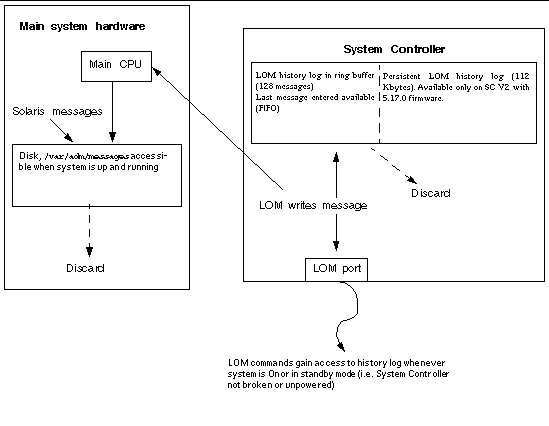| C H A P T E R 4 |
|
System Controller Message Logging |
The System Controller generates timestamped messages for system events, processes such as when powering on, booting, powering off, changes to hot pluggable units, environmental warnings, and so forth.
The messages are initially stored in the System Controller onboard memory in a circular 128-message buffer (note that a single message can span multiple lines). In addition, the System Controller sends the messages to the Solaris host when it is running Solaris, and these are processed by the system log daemon (syslogd). When Solaris is running, messages are sent at the time they are generated by the System Controller. Retrieval of messages not already copied from the System Controller takes place at Solaris boot time or when the System Controller is reset.
Messages can also be displayed at the Solaris prompt by using the lom(1m) utility (see Chapter 5).
Typically, the messages are stored on the Solaris host in the /var/adm/messages file, the only limiting factor being the available disk space.
Messages that are held in the System Controller message buffer are volatile and are not retained if the power is removed from the System Controller by loss of both power sources, less than two power supplies are operational, removal of the IB_SSC, or the System Controller is reset. Messages stored on the system disk are available when Solaris is rebooted.
The display of the messages on the shared Solaris/System Controller console port, when at the lom> prompt is controlled by the seteventreporting command (see the Sun Fire Entry-Level Midrange System Controller Command Reference Manual). This determines whether a message is printed at the lom> prompt at the time the message is logged, and also whether it is posted to the Solaris logging system so that it is written to /var/adm/messages.
FIGURE 4-1 illustrates the two message buffers.

Copyright © 2004, Sun Microsystems, Inc. All rights reserved.